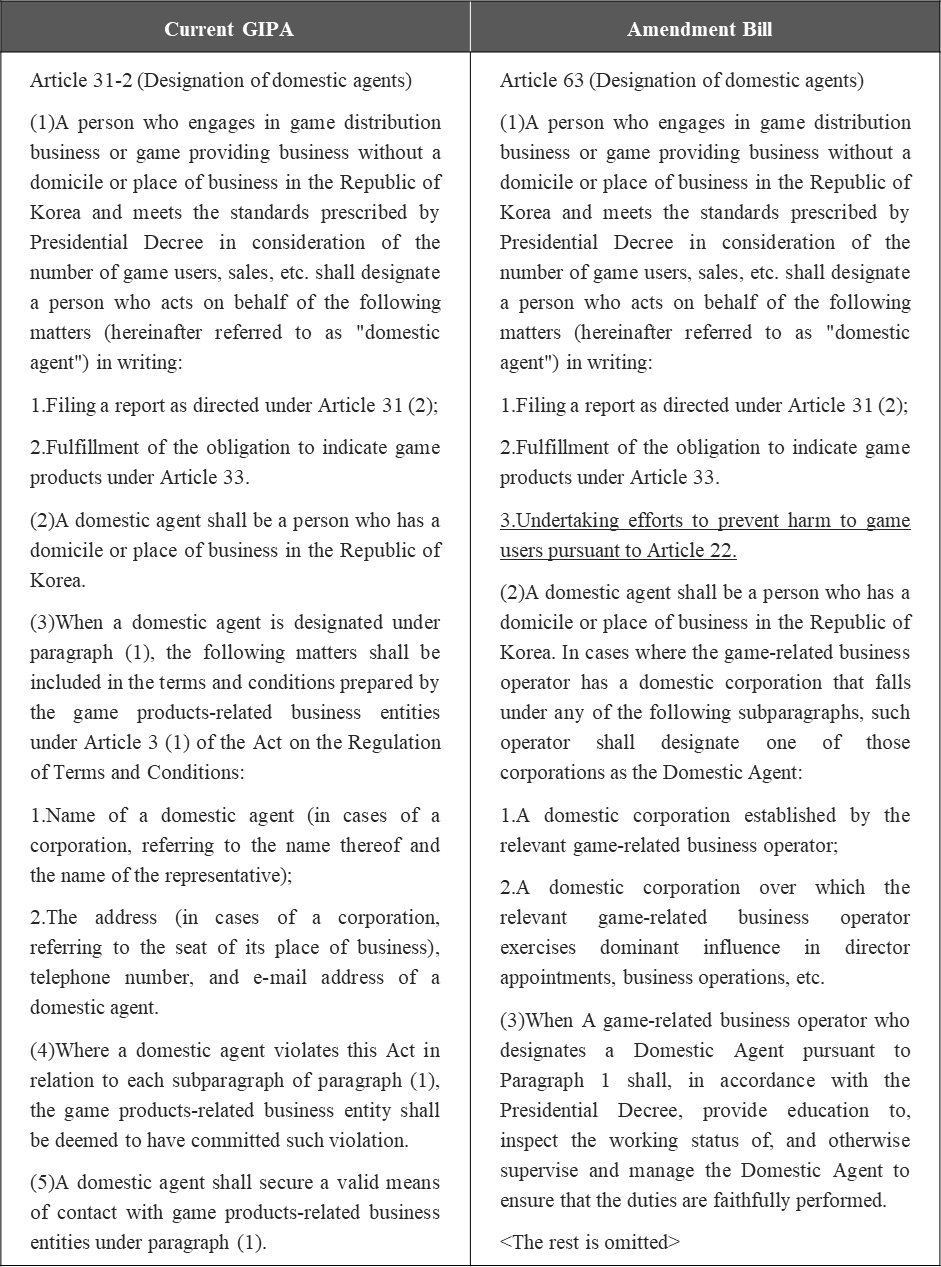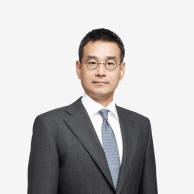본문
Proposed Full Amendment to the Game Industry Act: An overseas gaming companies' Perspective
- Newsletters
- 2025.09.26
Rep. Seungrae Cho has submitted the "Comprehensive Amendment Bill to the Act on the Promotion of Game Culture and Industry" to the National Assembly. This amendment seeks to respond to rapid changes in the gaming industry by shifting from regulation-focused governance to a regime centered on autonomy and creativity. In particular, it proposes restructuring the Game Rating and Administration Committee into the Game Promotion Agency and delegating digital game rating to private autonomous rating operators, simultaneously promoting deregulation and industry advancement.
While the amendment has significance from various perspectives—including the integration of promotion and regulatory governance, alignment with international standards, enhancement of global competitiveness, promotion of game culture and user convenience, the urgency of autonomy-based governance, and extra-territorial regulation on Loot box items—this newsletter focuses on two areas that stand out for overseas gaming companies: improvement of unreasonable prize regulations and reinforcement of the domestic agent system.
1. Background
2. Key Contents of the Proposed Amendment
3. Implications from an overseas gaming companies' perspective
1. Background
The current Game Industry Promotion Act (GIPA), enacted in 2006, has been criticized for failing to reflect significant changes in the gaming environment and industry since its enactment.
Rep. Cho explained, “As the current law, based primarily on arcade game regulations from 2006, is applied to today’s digital platform-based games, it has become outdated. Especially after the ‘Sea Story’ incident, the addition of anti-gambling provisions has led to criticisms that, despite its name, the law was more regulatory than promotional.”
Given the elevated status of K-Games in the global market, there is a growing consensus that policy focus should shift toward promoting industrial growth based on autonomy and creativity rather than continued regulation.
The amendment even changes the law’s name to the “Act on the Promotion of Game Culture and Industry,” explicitly stating its objective as “establishing a foundation for the game industry based on autonomy and creativity,” thus highlighting gaming’s cultural value.
2. Key Contents of the Proposed Amendment
A. Redefinition and Reclassification of Games
The term “game product” (“게임물”) is replaced with “game,” and gambling activities governed by special laws are explicitly excluded from the definition. Games are now classified as either “location-based games” or “digital games,” with differentiated regulatory frameworks based on each game’s characteristics.
B. Establishment of the Game Promotion Agency and Organizational Restructuring
The Game Rating and Administration Committee will be abolished and replaced with the Game Promotion Agency, which will be responsible for developing game culture, promoting the industry, and supporting/protecting game users. The Game Management Committee within the Agency will handle rating and illegal distribution prevention for location-based games.
C. Dualized Game Rating System
Rating for digital games will be handled by autonomous private entities designated by the Minister of Culture, Sports, and Tourism, expanding private self-regulation. Location-based games, on the other hand, remain strictly managed and rated directly by the Game Management Committee.
D. Stronger Regulation on Loot box Items
Mandatory disclosure of item types and supply probabilities within games is instituted, with liability for damages imposed for violations. Notably, intentional violations are subject to punitive damages—up to three times the amount—via the introduction of a punitive damages system.
E. Reinforcement of Self-Regulatory System
Industry associations and others can now establish and enforce self-regulatory codes, with legal grounds for government support of such activities.
3. Implications from an overseas gaming companies' perspective
Rep. Cho, as a former chief of the ruling party’s game special committee and spokesperson for the Government Policy Planning Committee, has had extensive exposure to gaming policy. Accordingly, it is anticipated that many of the amendment’s provisions will be translated into policy. Realistically, if passed by the National Assembly at year’s end and promulgated by the government, these changes could shape the industry environment starting in early 2027.
While the amendment is noteworthy for governance integration, alignment with international standards, global competitiveness, enhanced user support, urgent creation of self-regulatory governance, and extra-territorial application of probability item regulation, overseas gaming companies will feel the change most acutely in “the reasonable improvement of prize regulations” and “the strengthening of the domestic agent system.”
A. Rationalization of Prize Regulations and a New Phase for P2E Games
The current GIPA prohibits fostering gambling by supplying prizes. While, in theory, supplying prizes without promoting gambling should avoid the five-year imprisonment or KRW 50 million fine penalty, judicial precedent has consistently interpreted prize provision in games as inherently fostering gambling. Thus, the article has been effectively treated as a “prize provision prohibition” by the industry.
The amendment now restricts this prize prohibition clause to requirements for on-site (location-based) game operators. In short, online games will no longer be subject to the blanket prohibition of prize provision. This provision—widely criticized by both domestic and foreign operators as an anti-competitive, uniquely Korean rule that bans basic marketing methods—will no longer apply online, though the prohibition on currency exchange (Article 26(1)(7)) and the gambling review regime (Article 32, etc.) will continue to allow regulators to control gambling risks in online games.
However, this rationalization may bring new interpretations to the regulation of P2E (Play-to-Earn) games. Until now, courts have rejected appeals against denied P2E game ratings primarily relying on the “prize provision prohibition” clause. With this article gone, courts may look to the currency exchange prohibition and other such provisions when ruling on future cases.
B. Strengthening of Domestic Agent Regime and the Direction of User Protection Policy
Effective October 23, 2024, the obligation for overseas game companies to appoint a domestic agent will mirror domestic agent systems under the Personal Information Protection Act, the Telecommunications Business Act, and the Act on Promotion of Information and Communications Network Utilization and Protection of Information. These systems have matured over years of practical implementation, and the new amendment incorporates many of the best practices developed elsewhere. Examples include requiring a foreign game operator with a domestic corporation to appoint that entity as agent (Amendment Art. 63(2)), and imposing management/supervision obligations over the agent’s activities (Art. 63(3)).
Particularly notable is Amendment Article 63(1)(3), which explicitly requires the agent to make efforts “to prevent user harm,” a responsibility on par with damage remedy requirements under Personal Information Protection Act, and thus broader in its application. Amendment Article 67(2) authorizes corrective recommendations and orders by the government in cases of non-compliance, illustrating strong regulatory intent, even in the absence of penalties.

After the amendment’s expected enactment and promulgation at the end of the year, and implementation in early 2027, overseas gaming companies should expect the growing “damage remedy” role of domestic agents— a trend already being reflected in other major statutes — to become even more specific and robust in the context of the GIPA.
C. Conclusion
If enacted as intended, this amendment has the potential—per Rep. Cho’s vision—to serve as a new springboard for the stagnant gaming industry. By relaxing regulations and expanding autonomy, it enhances the sector’s creativity and dynamism while laying a stronger foundation for global competitiveness.
However, the success of these institutional improvements will ultimately depend on the industry’s own self-regulation and proactive efforts to foster a healthy gaming ecosystem that matches the expanded autonomy with commensurate responsibility.
With Korea’s game industry already enjoying a solid position in the global market, this legislative change may create new opportunities for advancement. If the industry and the government work together for successful implementation, K-Games’ global leadership is expected to become even more robust.
Yoon&Yang Game Center consists of professionals and experts with rich practical experience in relevant bodies, specializing in the game industry. We proactively monitor issues and are ready to respond quickly to all legal matters regarding the game sector. For inquiries, please contact us at any time.
- Practice Areas
- #Game Center






